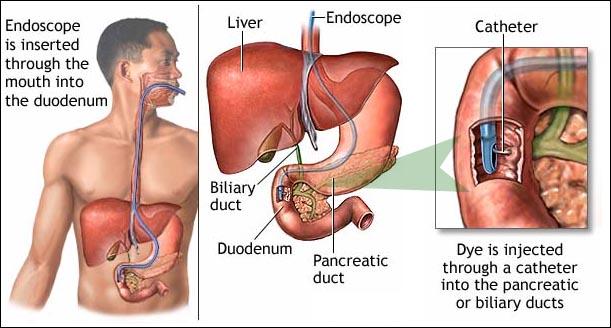
ERCP
An ERCP (Endoscopic Retrograde Cholangio-Pancreatography) procedure allows the doctor to take detailed X-rays of the bile duct and/or pancreas. You will lie on an X-ray table and the doctor who is to perform the test will explain briefly what will happen. Your throat will be numbed with a special spray. A fine soft tube will be placed into one nostril to give you a little oxygen to breathe during the test. You will be given an injection into your drip which will make you very sleepy. Once you are sleepy, an endoscope (a long, thin flexible tube with a bright light at one end) will be passed through your mouth, down into your stomach and the upper part of the small intestine (the duodenum). X-ray dye will be injected down the endoscope so that the pancreas and bile ducts may be seen on X-ray films. If everything is normal, the endoscope is then removed and the test is complete. The dye is passed out of your body harmlessly. If the X-rays show a gallstone, the doctor will enlarge the opening of the bile duct. This is done with an electrically heated wire (diathermy) which you will not feel. Any stones will be collected into a tiny basket or left to pass into the intestine. If a narrowing is found, bile can be drained by leaving a short plastic tube (endoprosthesis) in the bile duct. You will not be aware of the presence of the tube which will remain in place permanently. Occasionally it may be necessary to replace the tube some months later if it becomes blocked.

Before the test
To allow a clear view, the stomach and duodenum must be empty. You will therefore be asked not to have anything to eat or drink for at least six hours before the procedure. When you come to the department, the procedure will be explained and a doctor will ask you to sign a consent form. This is to ensure you understand the test and its implications. Please tell the nurse or doctor if you have had any previous endoscopic examinations, or reactions to drugs or allergies. In some situations, antibiotics are given by injection before the procedure. If you have any worries or questions at this stage don't be afraid to ask. The staff will want you to be as relaxed as possible for the test and will not mind answering your queries. You may be asked to take off your shirt or jumper and to put on a hospital gown. It will also be necessary for you to remove any false teeth or contact lenses. Jewellery or metal objects should also be removed because they interfere with X-rays and a special instrument called a diathermy. They will be kept safely until after the examination.
After the test
When you return to the ward, you will feel sleepy. The nurse will advise you when you can eat and drink. You will be told the results of the test and what treatment has been given. You should be allowed to leave the next day. You may be given an envelope with a report of what has happened to you during your stay in hospital. This should be given to your family doctor as soon as possible after you return home. You may read what is written in this report, but it contains only medical details which you will have already been told.
Going home
If you are having an ERCP without any additional treatment it is likely that you will be allowed home after the test, but it is essential that someone comes to collect you. Once home, it is important to rest quietly for the remainder of the day. Sedation lasts longer than you think.
You should not:
drive a car
operate machinery
drink alcohol
The effects of the test and sedation should have worn off by the next day when most patients are able to resume normal activities. If you are required to stay in hospital, the average length of stay is between 1-3 days, but it may be much longer if several procedures are necessary or if problems arise.
What are the risks and complications?
Fortunately, these procedures are very safe - this is why they are used instead of surgery. Problems do sometimes occur, however, but these can be explained if you wish by your doctor or hospital staff. If you have any problems after ERCP which you feel may be related to the test, please inform your doctor or hospital staff at once. An operation may be necessary to treat a complication, but this is very rare. Again, please do not hesitate to discuss possible complications or risks with hospital staff before ERCP.